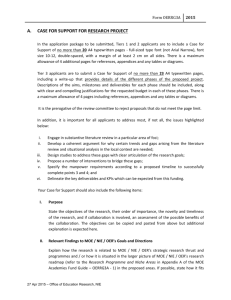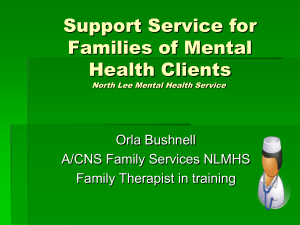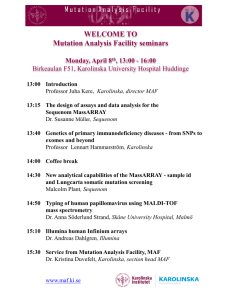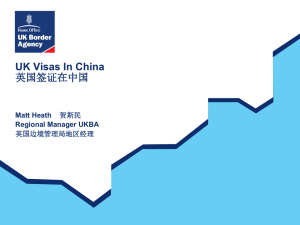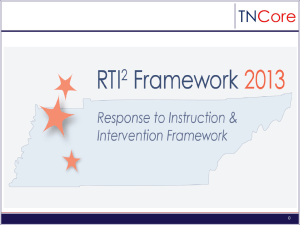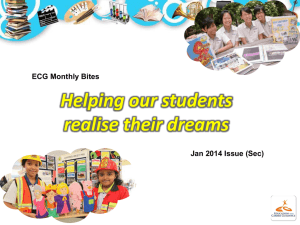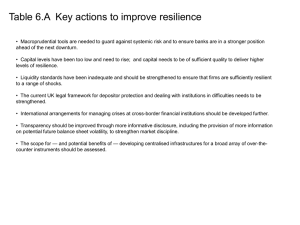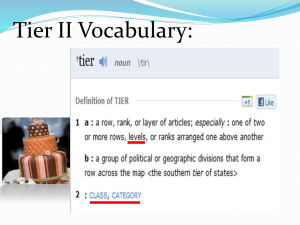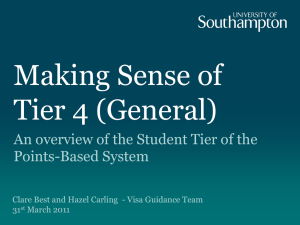here - National Institute of Education
advertisement
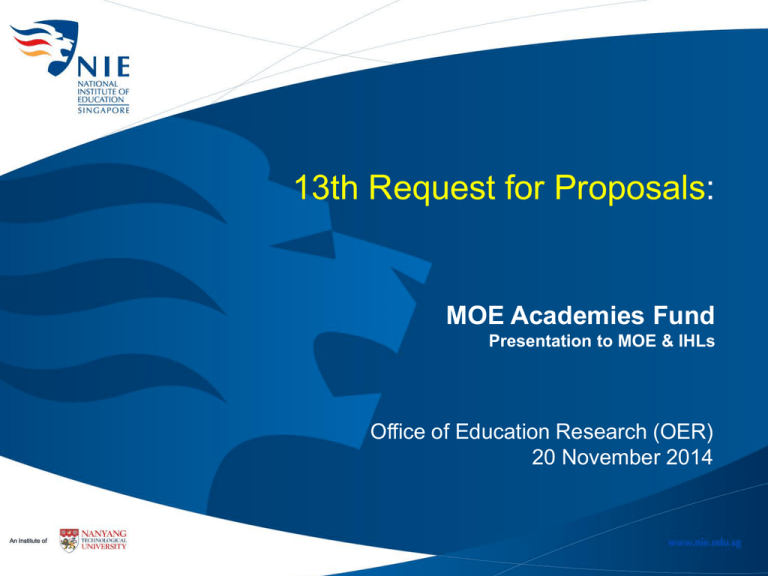
13th Request for Proposals: MOE Academies Fund Presentation to MOE & IHLs Office of Education Research (OER) 20 November 2014 Background The MOE Academies Fund (MAF) is a separate $10 million dollar grant that offers a stream of funding in the third tranche of the Educational Research Funding Programme (ERFP) in FY2013-2017, with specific objectives to: • support development and research projects that will contribute to the enhancement of pedagogical practices or the professional development of teachers • provide opportunities for the MOE Academies to focus on identifying key pedagogical and professional development approaches for researchers to test, evaluate and propose areas of improvements Background • The MAF is managed by the Office of Education Research (OER) at NIE. • Funding under the MAF is available to researchers outside of NIE to apply to the MAF grant as principal investigators, specifically from the following organizations and institutes: – Education officers from MOE Academies and Language Centres: • • • • • • Academy of Singapore Teachers (AST) English Language Institute of Singapore (ELIS) Physical Education and Sports Teacher Academy (PESTA) Singapore Teachers’ Academy for the aRts (STAR) Malay Language Centre of Singapore (MLCS) Umar Pulavar Tamil Language Centre (UPTLC) – Researchers and academic staff from Singapore’s Institutes of Higher Learning (IHLs) and polytechnics Education Research Projects • Primary goal – To produce new knowledge • Secondary goal – To improve practice 4 Development Projects • Primary goal – To improve practice • Secondary goal – To produce new knowledge 5 Research Project Types • Intervention – Researcher wishes to investigate the effectiveness of some intervention. – Usually a new way or means of teaching, curriculum, etc. – Develops it, and then tests its effectiveness. – Aim is to develop a new theory, challenge current theories. – Intended output: publish 6 Research vs Development • Intervention = R & d – Researcher wishes to investigate the effectiveness of some intervention. – Usually a new way or means of teaching, curriculum, etc. – Develops it, and then tests its effectiveness. – Aim is to develop a new theory, challenge current theories. – Intended output: publish • Development = r & D – Researcher wishes to effect changes to practice through some intervention. – Usually a new way or means of teaching, curriculum, etc. – Develops it, and then tests its effectiveness. – Aim is to develop a new way of teaching, PD, to improve practice. – Intended output: roll-out 7 A Strong Development Proposal Clear description of what is being developed, with clear objectives and measurable KPIs to evaluate success/effectiveness Strong justification for usefulness/potential impact of the idea through literature review, or description of past research/practice outcomes • Clarity in describing the deliverables – Say what your product/pedagogy/framework does in very clear and Inclusionetc. of an evaluative phase specific terms. that provides evidence that the Clear description of how the – You can write these as KPIs or as guiding questions. Justwhich like research product/process has been product/process will be questions, they should be precise. developed meets the desired developed objectives, andproduct achieves – We can use them to evaluate the effectiveness of your bythe examining desired outcomes. these KPIs or guiding questions. 8 A Strong Development Proposal Clear description of what is being developed, with clear objectives and measurable KPIs to evaluate success Strong basis that the outcomes are feasible, useful and can be implemented, and that potential impact is wide • Show that the deliverables/outcomes useful, practical, effective and have very strong potential to have wider and even impact Inclusion of an systemic evaluative phase beyond the scope of the project: that provides evidence that the Clear description of how the product/process which been – You must be clear that you take into account the present context and has current product/process will be developed meets the desired practice/policy. developed objectives, and the or – You must demonstrate how the deliverables of the project canachieves be implemented outcomes. continue beyond the project. This cannot simply desired be a theoretical possibility. 9 A Strong Development Proposal Clear description of what is being developed, with clear objectives and measurable KPIs to evaluate success Strong basis that the outcomes are feasible, useful and can be implemented, and that potential impact is wide • Provide a strong basis for the feasibility and worthiness of the project through any of the following: Inclusion of an evaluative phase – Experiences of the researcher: e.g. if you’ve been using this for a number of years, that provides evidence that the work with a of teacher Clear or description howwho thehas used this way of teaching … product/process which has been –product/process Ideas tested/trialled a smaller pilot: e.g. perhaps in an SUG, an action research willinbe developed meets the desired project, etc. developed objectives, and achieves the – Literature review: this differs from research projects, and should focus not only on desired outcomes. theory but on applicability. E.g., the review could focus on the success of some intervention in some other context. 10 A Strong Development Proposal • Show how you will ensure that the product/process/framework etc. Clear description of what is being Strong argument that the can be developed: developed, with clear objectives outcomes are feasible, useful and – Expertise of the team and measurable KPIs to evaluate can be implemented, and that – Clear development processes/life cycles success potential impact is wide – Budgeting for appropriate resources Clear description of how the product/process will be developed Evaluation of the project deliverable which provides evidence that the developed product/process meets the desired objectives, and achieves the intended outcomes. 11 A Strong Development Proposal • The development must always be accompanied by the evaluation of Clear description of what is being Strong argument that the the product/process/framework etc: developed, with clear objectives outcomes are feasible, useful and – Run a small evaluation/test to show that product outcomes are as you’ve and measurable KPIs to evaluate can be implemented, and that indicated. success potential impact is wide – – You can go back and tweak the development based on the evaluation – iterative development cycle. Ensure your project timeline takes the evaluation phase into account. Clear description of how the product/process will be developed Inclusion of an evaluative phase that provides evidence that the developed product/process meets the desired objectives, and achieves the intended outcomes. 12 A Strong Development Proposal Clear description of what is being developed, with clear objectives and measurable KPIs to evaluate success Strong basis that the outcomes are feasible, useful and can be implemented, and that potential impact is wide Clear description of how the product/process will be developed Inclusion of an evaluative phase that provides evidence that the developed product/process meets the desired objectives, and achieves the intended outcomes. 13 Case for Support 14 Four Categories of Development Ideation or Proof of Concept Translation • Development of existing ideas into implementable modalities. • E.g. synthesis of existing principles, theories or findings to develop PD frameworks, curriculum/lesson material packages for your school/cluster. • Implementation of tested ideas in new contexts. • E.g. implementing an idea at another level, another subject in the same school, another school. Scaling • Implementation of tested ideas in an increasing range or number of sites. • E.g. a scaling project involves implementing the tested idea in an increased number of classes or schools effectively. Knowledge Management • Development of ideas that focus on the codification, transfer, and re-utilization of knowledge. • E.g. development of a system to capture specific types of knowledge so as to improve practice, increase flow of information, etc. 15 Four Categories of Development Ideation or Proof of Concept Translation • Development of existing ideas into implementable modalities. • E.g. synthesis of existing principles, theories or findings to develop PD frameworks, curriculum/lesson material packages for your school/cluster. • Implementation of tested ideas in new contexts. • E.g. implementing an idea at another level, another subject in the same school, another school. Scaling • Implementation of tested ideas in an increasing range or number of sites. • E.g. a scaling project involves implementing the tested idea in an increased number of classes or schools effectively. Knowledge Management • Development of ideas that focus on the codification, transfer, and re-utilization of knowledge. • E.g. development of a system to capture specific types of knowledge so as to improve practice, increase flow of information, etc. 16 Four Categories of Development Ideation or Proof of Concept Translation • Development of existing ideas into implementable modalities. • E.g. synthesis of existing principles, theories or findings to develop PD frameworks, curriculum/lesson material packages for your school/cluster. • Implementation of tested ideas in new contexts. • E.g. implementing an idea at another level, another subject in the same school, another school. Scaling • Implementation of tested ideas in an increasing range or number of sites. • E.g. a scaling project involves implementing the tested idea in an increased number of classes or schools effectively. Knowledge Management • Development of ideas that focus on the codification, transfer, and re-utilization of knowledge. • E.g. development of a system to capture specific types of knowledge so as to improve practice, increase flow of information, etc. 17 Four Categories of Development Ideation or Proof of Concept Translation • Development of existing ideas into implementable modalities. • E.g. synthesis of existing principles, theories or findings to develop PD frameworks, curriculum/lesson material packages for your school/cluster. • Implementation of tested ideas in new contexts. • E.g. implementing an idea at another level, another subject in the same school, another school. Scaling • Implementation of tested ideas in an increasing range or number of sites. • E.g. a scaling project involves implementing the tested idea in an increased number of classes or schools effectively. Knowledge Management • Development of ideas that focus on the codification, transfer, and re-utilization of knowledge. • E.g. development of a system to capture specific types of knowledge so as to improve practice, increase flow of information, etc. 18 Evaluation of Project Proposals • Tier 1 ( less than $100,000) – Decisions by the OER Education Research Committee (ERC) chaired by Dean/OER. • Tier 2 ($100,000 to less than $250,000) – Decisions made by the NIE ERC, chaired by Director/NIE. • Tier 3 ($250,000 and above) – Decisions made by the MOE ERC, chaired by PS/MOE. 19 Panel of Reviewers for MAF Research Projects Tier 1 (< $100k) Tier 2 ($100k - $250k) Tier 3 (>$250k) Reviewers (NIE) 1 reviewer 1 reviewer 1 reviewer Reviewers (Nominated) 1 reviewer 1 reviewer 1 reviewer Reviewers (External) 1 reviewer 1 reviewer 3 reviewers -- After recommendation by OER ERC, Tier 2 & 3 projects are sent to MOE Directors for feedback. Feedback by MOE Panel of Reviewers for MAF Development Projects Reviewers (NIE) Reviewers (non-NIE) Tier 1 (< $100k) Tier 2 ($100k - $250k) Tier 3 (>$250k) 1 reviewer 1 reviewer 1 reviewer 2 reviewers 2 reviewers 2 reviewers - MOE non-directors - Faculty from IHLs - MOE non-directors - Faculty from IHLs - MOE non-directors - Faculty from IHLs 1 reviewer 1 reviewer - MOE director - MOE director 1 reviewer - Faculty from international IHL Funded MAF Research Projects MOE Academies Fund Research Endorsing Department Title PI Tier A Study on Developing Teacher Leadership and Engendering an Emerging Teacher-led Culture Dr Liang See TAN Tier 1 Singapore Teachers’ Academy for the aRts (STAR) A Two-Tiered Approach to Supporting Pupils with Reading Difficulties in P3 Mainstream Classrooms Dr Chee Soon TAN Tier 1 English Language Institute of Singapore (ELIS) A Preliminary Study of Assessment Progression: Evaluation of Assessment for Learning Lessons and Summative Assessment Tasks in General Music Programme (GMP) Dr Wei Shin LEONG Metacognition and Mathematical Problem Solving – Teaching and Learning at the Primary Levels (MetaMaps (Primary)) Asst/Prof Ngan Hoe LEE Tier 1 Tier 1 Singapore Teachers’ Academy for the aRts (STAR) Academy of Singapore Teachers (AST) Funded MAF Development Projects MOE Nature of Academies Development Fund Title PI Implementing the 3Ps Professional Development Framework in the Design of Asst/P Chee Hoo LUM a New Professional Development Curriculum Tier Endorsing Department Tier 1 Singapore Teachers’ Academy for the aRts (STAR) Ideation/ Proof of Concept Knowledge Construction in Networked Learning Communities in One Portal All Learners (OPAL) Dr S RAVINDRAN Tier 1 Academy of Singapore Teachers (AST) Enhancing the Pedagogy of Mathematics Teachers to Facilitate the Development of 21st Century Competencies in their Classrooms (EPMT – 21st CC) Prof Berinderjeet KAUR Tier 1 Academy of Singapore Teachers (AST) Knowledge Management - - - - Scaling - - - - Development Translation Application Timeline Timeline 20 November 14 Briefing Session to interested MAF applicants at AST 8 December 14 Applicants to indicate their expression of interest no later than 8 Dec 2014. 5 January 15 Feedback session for MAF applicants 7 January 15 Submission of proposal to Reporting Officer for endorsement. 19 January 15 Submission deadline: application must be received by OER,NIE. NOTE: • • Tier 1 and 2 projects that receive approved funding will generally commence in May 2015. Tier 3 projects will generally commence in either June or July 2015. Expression of Interest MAF • Applicants to indicate their expression of interest via email (oergrant@nie.edu.sg). • Include name of Principal Investigator, tentative title of the project, category of project (research or development), keywords (max. 5) and an abstract (approx. 500 words). The MAF application documents can be found at the NIE website: http://www.nie.edu.sg/office-education-research /grants-application/moe-academies-fund 25 MOE Academies Fund Application Process and Documentation 20 Nov 2014 Application Process 8 December 14 Expression of Interest Applicants to indicate expression of interest via email: oergrant@nie.edu.sg Include: name of Principal Investigator, tentative title of the project, category of project (research or development), keywords (max. 5) and an abstract (approx. 500 words). For IHLs Applicants Based on the abstracts, the Academies/Language Centres (LCs) will shortlist applicants from IHLs to present at the feedback session. Shortlisted applicants who have received the support from the Academies/LCs will then be informed to prepare the proposals and presentation slides for the feedback session. Note: Support from the Academy/Language Centre does not equate an “approval”. It simply means the Academy/Language Centre agrees for the proposal to go through OER’s review process. 5 January 15 Feedback Session Part 1: NIE colleagues to provide feedback for applicants from Academies/LCs Part 2: IHLs applicants to present to Academies/LCs representatives and for the latter to give feedback. Academies/LCs can sign off on the spot if they support the proposals. Alternatively, Academies/LCs may indicate their support via email. Application Process 19 January 15 7 January 15 Submission deadline. Applicants who have received the support from the Academies/LCs to submit completed proposals to Reporting Officer for endorsement. Soft copy of the application documents to be sent to OER Grant Management Unit (oergrant@nie.edu.sg) 22 January 2015 Hard copy of the application documents to be sent to OER Grant Management Unit: OER Grant Management Unit Office of Education Research National Institute of Education, NIE 5-03-56A, 1 Nanyang Walk Singapore 637616 OER’s Review Process - Tier 1 and 2 projects that receive approved funding will generally commence in May 2015. Tier 3 projects will generally commence around June 2015. Academy/Language Centre’s Point of Contact AST Mr Benjamin Yong Assistant Director, Standards and Research (Benjamin_YONG@moe.gov.sg) ELIS Dr Christopher Ward Programme Director, Resesarch (Christopher_STEPHEN_WARD@moe.gov.sg) PESTA Mr Goh Kee Yong Programme Director (GOH_Kee_Yong@moe.gov.sg) STAR Mr Lim Kok Boon Programme Director (Art) (LIM_Kok_Boon@moe.gov.sg) Mrs Tan-Chua Siew Ling Programme Director (Music) (CHUA_Siew_Ling@moe.gov.sg) MLCS Mr Mohamed Noh Daipi Centre Director/MLCS and ADMTL1 (Mohamed_Noh_DAIPI@moe.gov.sg) UPTLC Mr Jeyaradas Pandian Supervisor/UPTLC (Jeyarajadas_PANDIAN@moe.gov.sg) Application Form The application documents can be found on: http://www.nie.edu.sg/office-education-research/grants-application/moeacademies-fund Application Form The MOE Academies Fund Form (OERRG3A) contains tooltips which you can activate by moving your mouse over the relevant terms when you see an information logo . MAF Budget Documents NIE Website http://www.nie.edu.sg/office-educationresearch/grants-application/moe-academies-fund - Budget templates for MAF project can be found in (5) and (7) - Budgeting guide for MAF project can be found in (3) Important! Thank you!
